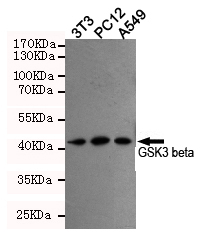-
Product Name
Anti-GSK3 beta (3D10) Mouse antibody
- Documents
-
Description
GSK3 beta (3D10) Mouse monoclonal antibody
-
Tested applications
WB, IHC-P, ICC/IF, FC
-
Species reactivity
Human, Mouse, Monkey, Rat
-
Isotype
Mouse IgG2a
-
Preparation
Antigen: Purified recombinant fragment of human GSK3B expressed in E. Coli.
-
Clonality
Monoclonal
-
Formulation
Ascitic fluid containing 0.03% sodium azide.
-
Storage instructions
Store at 4°C short term. Store at -20°C long term. Avoid freeze / thaw cycle.
-
Applications
WB: 1/500 - 1/2000
IHC: 1/200 - 1/1000
ICC: 1/200 - 1/1000
FC: 1/200 - 1/400
ELISA: 1/10000
-
Validations

Western blot detection of GSK3 beta in 3T3, PC12 and A549 cell lysates using GSK3 beta mouse mAb (dilution 1:500).Predicted band size:46KDa.Observed band size:46KDa.
-
Background
Swiss-Prot Acc.P49841.Glycogen synthase kinase 3 (GSK-3), a serine-threonine kinase with two isoforms (alpha and beta), was originally discovered as a key enzyme in glycogen metabolism. GSK-3 was subsequently shown to function in cell division, proliferation, motility and survival. GSK-3 plays a role in a number of pathological conditions including cancer and diabetes and is increasingly seen as an important component of neurological diseases. GSK-3 phosphorylates tau and presenilin-1, which are involved in the development of Alzheimer's disease. Both isoforms of GSK-3 are ubiquitously expressed, although particularly high levels of GSK-3beta are found in the brain where it is involved in synaptic plasticity, possibly via regulation of NMDA receptor trafficking. GSK-3 phosphorylates over 40 different substrates including signaling proteins, transcription factors and structural proteins, and is part of the signal transduction cascade of a large number of growth factors and cytokines. The activity of GSK is regulated by phosphorylation (Akt: Akt-mediated phosphorylation at Ser21 of GSK-3α and Ser9 of GSK-3β, S6K, RSK, PKA and PKC), dephosphorylation (PP1 and PP2A), and by binding to protein complexes (with beta-catenin, axin, CK1 and the APC complex).
Related Products / Services
Please note: All products are "FOR RESEARCH USE ONLY AND ARE NOT INTENDED FOR DIAGNOSTIC OR THERAPEUTIC USE"
